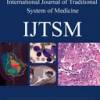Volume 10, Issue 1, 2023

Mcmed International
International Journal of Traditional System of Medicine
Issn
XXX-XXXX (Print),
XXXX-XXXX (Online)
Frequency
bi-annual
Email
editorijtsm@mcmed.us












